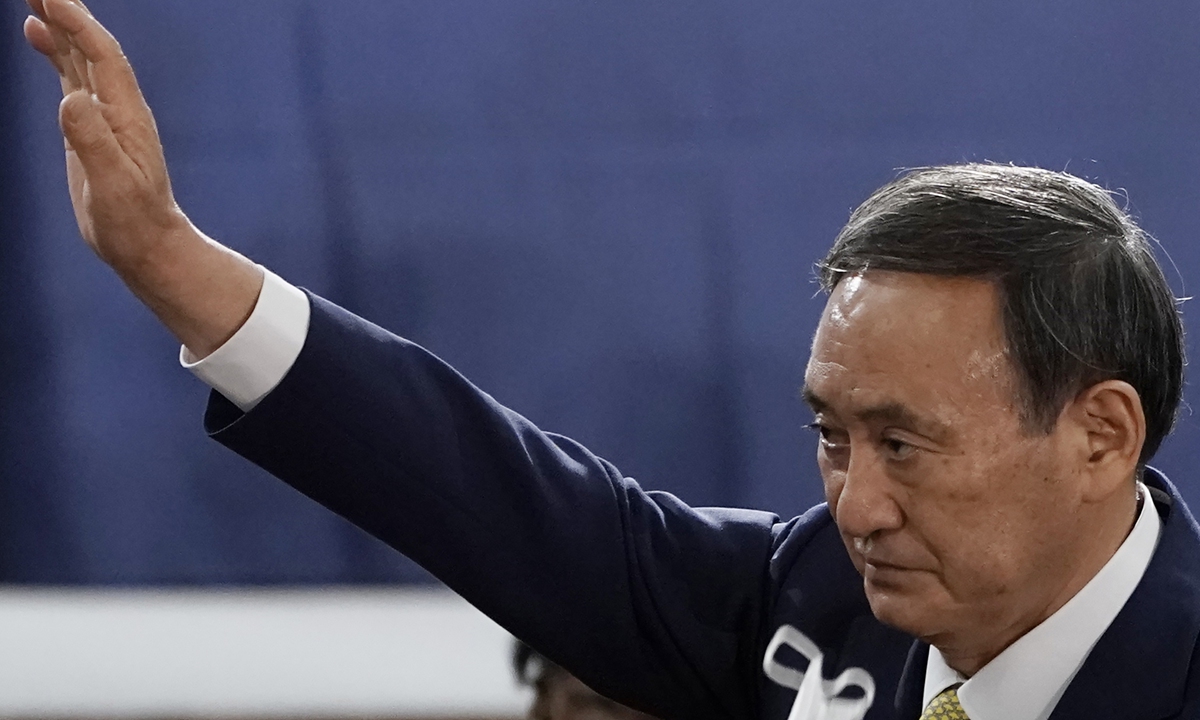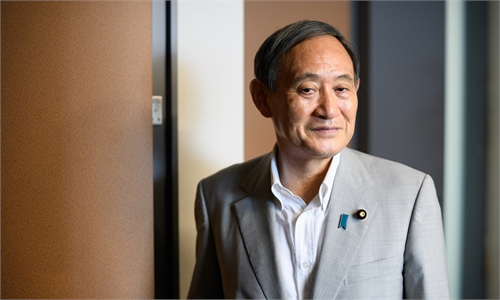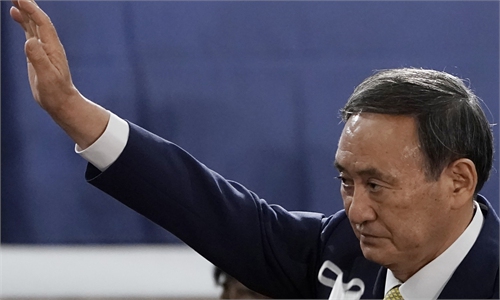Yoshihide Suga wins LDP leadership election to succeed Abe
China-Japan ties to remain stable, say experts

Japan's Chief Cabinet Secretary Yoshihide Suga reacts after being elected as new head of Japan's ruling Liberal Democratic Party at the party's leadership election in Tokyo on Monday. Photo: AFP
Japanese Chief Cabinet Secretary Yoshihide Suga won the election on Monday afternoon to become the new president of Japan's Liberal Democratic Party (LDP), with Suga set to become the East Asian country's next prime minister. Chinese experts said Japan's relations with China would remain in steady hands as Suga will mostly retain Shinzo Abe's foreign policies.
Wang Wenbin, spokesperson for the Chinese Foreign Ministry, on Monday afternoon congratulated Suga on winning the LDP leadership election. He said that China is ready to work with the new LDP leader to deepen cooperation in fighting the COVID-19 pandemic and on economic and social development, and push for the continuous improvement of China-Japan relations.
According to the Japan Times, Suga, 71, won by a landslide in the LDP presidential election with 377 votes, or roughly 70 percent of the total 534 votes, becoming the presumptive successor to outgoing prime minister Shinzo Abe.
Suga, who has been one of Abe's closest confidants for almost eight years, is expected to take the helm at a critical moment when the country has been hit by an epidemic, an economic slump and grappling with national security issues.
Since the LDP-led coalition controls both houses of the Diet, which elects the prime minister, the next leader of the LDP will also succeed Prime Minister Abe, who announced his resignation last month citing health reasons.
Suga will be named the new prime minister at an extraordinary Diet session to be convened on Wednesday.
With one year left in Abe's term, Suga is expected to be a "caretaker" to continue Abe's foreign policies and maintain ties between China and Japan, said analysts.
Some said Suga may dissolve parliament and call an early election, which would give him more political space.
Analysts pointed out that it is of no fundamental significance whether the Suga administration will be a little better or worse toward China than the Abe administration as Japan's ensuing attitude toward China has been roughly framed by the overall China-US relationship and Japan's national interests based on realistic conditions.
Da Zhigang, director and research fellow of the Institute of Northeast Asian Studies at the Heilongjiang Provincial Academy of Social Sciences and chief expert at the Northeast Asian Strategic Studies Institute, told the Global Times on Monday that in general, stability would still be the top priority between China and Japan.
In the context of this year's COVID-19 outbreak, subtle changes have taken place in China-Japan relations, Da said.
The differences between China and Japan include those over the national security law for Hong Kong, the origin of the raging pandemic, the Taiwan question, and the Diaoyu Islands, Da said, noting that Japan is also trying to reduce its dependency on China in its industrial chain.
Da stressed that in some areas, the differences between China and Japan will be effectively managed, but in some areas they will expand slowly, such as the conflict over Diaoyu Islands.
Opportunist between China, US
In his policies he set out on Saturday for the LDP election campaign, Suga pledged to "build stable ties with neighboring nations such as China," while keeping the Japan-US alliance as the foundation of Tokyo's diplomacy and security, which is in line with Abe's stance, Japanese media reported.
Although Tokyo is always a loyal follower of Washington, Japan will not completely lean on to one side with the US strategy of suppressing China, especially before the uncertain US presidential election, since Japan also needs sound economic ties with China to realize its post-pandemic economic recovery, Lian Degui, deputy director of the Center for Asia-Pacific Studies at the Shanghai Institute for International Studies, told the Global Times on Monday.
China-Japan ties have been generally warm over past few years, which can also be reflected over the two country's people-to-people exchanges. Chinese analysts said the trend of increasing favorable and friendly ties between the two peoples should not be interrupted by the political power transition and the new Japanese leader should make sure the trend does not reverse.
The latest survey launched by the Global Times and the China Institutes of Contemporary International Relations (CICIR), which was conducted among 1,960 participants in China from August 17 to 20, showed that 26.6 percent of participants believe that China's "most favorable neighbor" is Japan, ranking the third behind Russia (48.8 percent) and Pakistan (35.1 percent).



